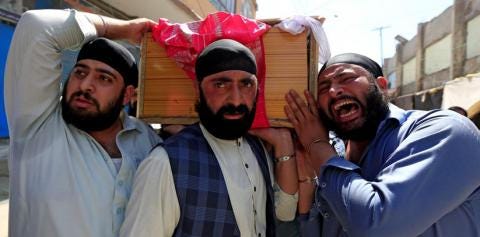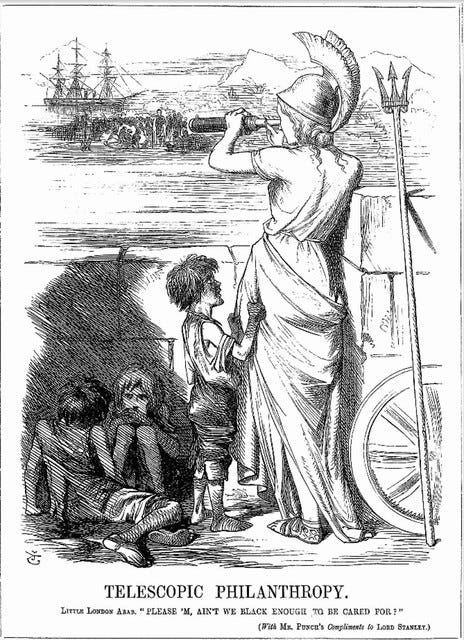(Your Voice is a reader-led initiative where our readers contact us with their own opinion pieces based on discussions facilitated in our chat threads. While we understand that your voice is important, due to the amount of correspondence received, we reserve the exclusive right to publish what we deem acceptable and insightful to and for our other readers).
Twitter poster, RSS feed founder, and former special forces soldier John Robb introduced the idea of "network war" into the mainstream with his 2007 book "Brave New War." His synopsis—and the topic he has been consistently writing about for twenty years—is that modern wars are no longer fought with the raw mobilization of men and resources that we observed in the 20th century. Contrastingly, current wars are primarily fought through moral networks, with millions of nodes (people) that provide constant, accelerating outrage and ethical cover for military, economic, and media action against a target. Thus, activating the outrage spiral in a network is a necessary prior step to any kind of physical conflict.
Fundamental to the outrage spiral is a sense that the participants are on one side—"we" are against "the bad thing." The thing being rallied against, and this is vital, cannot be portrayed with any nuance whatsoever. It must be the greatest evil of all time, full stop, and inconvenient facts will not be mentioned. The viciousness of outrage spirals is that there is no moderating mechanism—since members of the proverbial mob don't have to do anything except talk and exercise social pressure, social media attention increasingly rewards the most extreme voices. This is why, immediately after the Russian invasion of Ukraine, you had increasingly deranged statements from former Western officials advocating a direct conflict between the United States and Russia, sure to result in nuclear war.
These outrage spirals should be immediately recognizable to anyone with a passing familiarity with the 20th century; it is the kind of emotional war-mentality that propaganda has always tried to produce to inflict violence on the enemy.
In the last year, we've seen the same outrage spiral when the Palestinian group Hamas attacked southern Israel. Both the Israeli side (significantly better funded and with more mainstream access) and the Arab side inundated the digital world with horrible images and breathless (and commonly false) narratives, which have utilized left-leaning terminology to draw left-leaning Sikhs into the whirlwind of "solidarity" with the Arabs of the Levant.
On the other side, Hindutva fanatics and online nationalist mouth-breathers constantly comment under videos of Israeli airstrikes or dead Arabs, overjoyed that Muslims somewhere are getting killed. Both positions are deeply distasteful, but the attempt to draw Sikhs into supporting the Palestinian cause by using Gurbani and history is simply egregious.
The first argument they use is the flattering assertion that "Sikhs have always fought oppression," and that we must combat another's tyrant. When this historically ever happened is left vague. This is deliberately obfuscating what is happening by deceitfully changing definitions. You can tell that this is what they are doing when they use left-wing buzzwords like "liberation" (from what?) and "solidarity" (with whom?) repeatedly.
We have established that the outrage spiral is a continuation of war propaganda, which seeks to mobilize a population against an enemy. But these left-wing Sikhs either conceal or do not think very deeply about who this war propaganda is benefiting. Why is it being pushed on Sikh communities? Who are "we" supposed to be in "solidarity" with? Why? Would they do the same for us?
To directly address the two claims: Sikhs do not fight for "liberation" everywhere around the world. No people have ever done this, and it would make no sense to do so anyway. Historically, Sikhs have fought the oppressors of Sikhs, and those oppressors were mostly Sunni Muslims, like the Palestinians. There were many states in India in the 18th century that would be called "oppressive" by today's liberals, but the Sikhs did not fight them, or even bother with them, instead fighting only the enemies of the Panth, and those who paid Rakhi to the Panth. What is actual liberation? Khalsa Raj. Is that likely in Palestine? No.
Secondly, Sikhs do not stand in "solidarity" with some sort of global proletariat or "marginalized communities." Solidarity implies a common interest or endeavor. There is no Sikh in Palestine, Lebanon, or Syria. Even more broadly, the global left has zero interests in common with Sikhs. What they seek to do is to transmute televised suffering into emotional support of what the global left wants, but these ends are not Sikh ends. Instead of a life of struggle against the beast within and the Maleccha without, the global left's vision of the future is that of a luxury prison. Why should we serve their ends?

Really, we cannot serve their ends, idols, and ideology. Why?
Because we are Sikhs. What is a Sikh? A disciple (chela) of the Guru. Who is the Guru? The Guru is the Guru Granth and Guru Panth. Serving the Panth is being a chela of the Guru—this is the most fundamental definition of what a Sikh is. Serving other causes, other peoples, ideologies, or religions is not being a servant of the Guru.
Some argue that because the Sikhs stopped predatory practices of the Mughals and Afghans, we owe our support to the downcast and helpless of the world. This too is trickery; Guru Gobind Singh showed the way when visiting Dalits asked to be liberated from their tax collectors—they were instructed to take Amrit and bear arms as Singhs if they wanted liberation. Our answer should be the same—if the Palestinians want to change their situation, arms are available to them. However, most pro-Palestine moral shaming is not genuine, but rather "telescopic philanthropy."
The term refers to a specific species of performative sympathy, coined in Victorian England, where someone will express empathy and support for some people suffering far away but studiously ignore the suffering happening right in their backyard.
This "philanthropy" has nothing to do with helping anyone and has everything to do with being seen supporting the cause du jour. The Sikhs that are ardently arguing for "support" of Palestine are not actually invested in the outcome of the conflict. Two years ago, they probably did not care, and two years from today, they will have forgotten it again. Instead, the preening is intended to establish themselves as bona fide members of the Global Left, seeking status and some sort of place in the rainbow coalition. They seek to be acknowledged as "a good minority group"; they want praise; they want to be held up. But as the 10th Master reminded us of when a Sikh feared that he would be accused of slaughtering a cow, "Do not let the world judge your virtue." If you cede this power—the power of others to judge you—you are supplanting the Guru with the approval of a politically psychotic force that will abuse you and discard you.
An effortless way to check what the pro-Palestinian Sikhs are really loyal to is to ask their opinion on something advocated by the left but forbidden by Gurbani. They will readily abandon the latter in favor of the former. Sikhs should most definitely not get sucked into mentally adapting the war-mind of one side or the other—most fights, in fact, do not concern us. We are done dying for others.








Very insightful article!